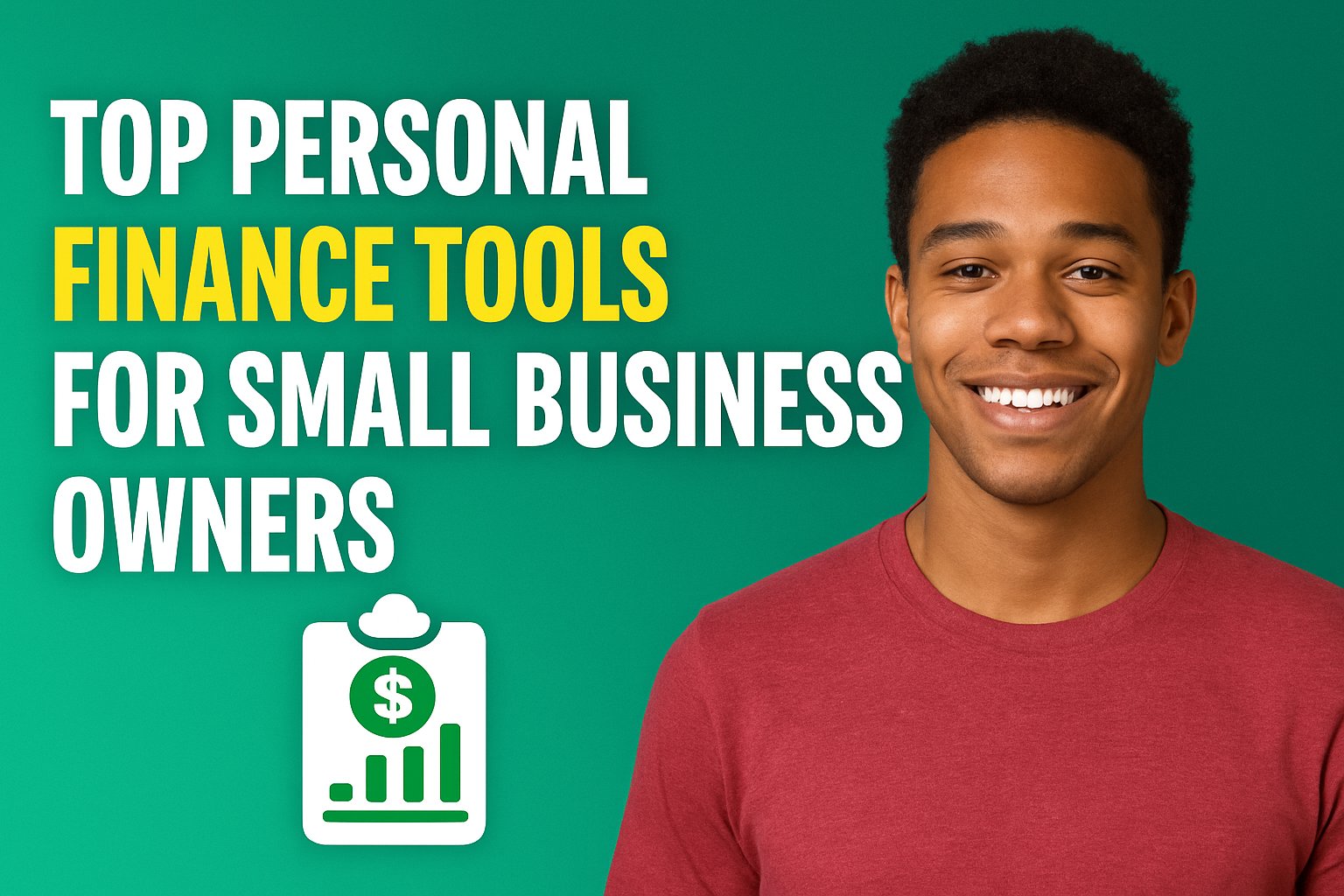Top Personal Finance Tools for Small Business Owners can make a major difference in managing both your business and personal finances with confidence. Running a small business means wearing many hats — from CEO to bookkeeper — and staying on top of your money is crucial for long-term success. Fortunately, there are a variety of powerful tools available to help you budget smarter, invoice faster, prepare for taxes, build credit, and invest in your future. In this guide, we’ll explore some of the best personal finance tools every small business owner should consider.
1. Budgeting and Expense Tracking
The Foundation of Strong Finances:
Effective budgeting and expense tracking are essential for any small business owner aiming for long-term success. Having clear visibility into where your money is going helps you manage cash flow, reduce unnecessary expenses, and plan for future growth. Thankfully, several user-friendly tools make daily financial management much easier.
Recommended Tools
- Mint: Mint automatically connects to your financial accounts, categorizes transactions, and offers visual insights into your spending habits. It’s especially useful for distinguishing between personal and business expenses.
- You Need a Budget (YNAB): YNAB takes a proactive approach by encouraging users to assign every dollar a specific role. It’s particularly valuable for small business owners who need to prepare for seasonal income fluctuations or unexpected costs.
Both tools provide mobile access, real-time updates, and customizable budgets, helping you stay financially organized wherever you are.
2. Invoicing and Payment Management
Timely invoicing and smooth payment collection are critical for maintaining healthy cash flow. Small business owners often juggle multiple clients and projects, so having reliable tools to manage billing efficiently can prevent delays and reduce administrative stress.
Recommended Tools
- FreshBooks: Designed with freelancers and small businesses in mind, FreshBooks offers easy-to-use invoicing, online payment acceptance, and automatic reminders for overdue accounts. It also tracks billable hours and integrates with popular accounting platforms.
- Wave: Wave is a free, comprehensive tool that lets you create professional invoices, accept online payments, and manage receipts. Its intuitive interface makes it ideal for startups and solopreneurs looking for an all-in-one financial solution.
Choosing the right invoicing tool can save you valuable time, help you get paid faster, and provide a more professional experience for your clients.
3. Financial Reporting and Tax Preparation
Staying Organized for Tax Time and Beyond:
Accurate financial reporting is essential not only for tracking your business’s health but also for simplifying the tax filing process. Without organized records, small business owners risk missing out on deductions or facing unnecessary stress during tax season. The right tools make it easier to generate clear reports, monitor income and expenses, and stay compliant with tax requirements.
Recommended Tools
- QuickBooks: One of the most trusted accounting tools for small businesses, QuickBooks tracks income, expenses, payroll, and inventory. It integrates easily with tax software, generates detailed reports, and provides your accountant with everything needed to file accurately and efficiently.
- TurboTax Self-Employed: Ideal for entrepreneurs, freelancers, and side hustlers, TurboTax Self-Employed helps uncover hidden deductions, organizes your income and expense categories, and walks you through the tax filing process step-by-step.
Using these tools year-round—not just at tax time—will give you better control over your finances and minimize last-minute headaches.
4. Business Credit Monitoring
Building a Strong Financial Reputation:
Establishing and maintaining good business credit can open doors to better financing options, lower insurance premiums, and stronger supplier relationships. Regularly monitoring your business credit helps you catch errors, spot potential issues early, and take proactive steps to strengthen your financial standing.
Recommended Tools
- Nav: Nav provides free access to personal and business credit reports, along with tailored financing recommendations. Their platform helps you understand the factors affecting your credit profile and offers tips to improve it over time.
- Dun & Bradstreet CreditMonitor: As a leader in business credit reporting, Dun & Bradstreet’s CreditMonitor service offers in-depth insights into your business credit file and alerts you to any significant changes that could impact your ability to secure funding.
Monitoring your business credit regularly ensures you’re in a strong position when opportunities for loans, lines of credit, or partnerships arise.
5. Retirement and Investing Tools
Planning for Long-Term Financial Security:
Unlike traditional employees, small business owners must take the lead in securing their own financial futures. Setting up retirement plans and making smart investment decisions are critical steps toward building lasting wealth and ensuring financial independence beyond your working years.
Recommended Tools
- Fidelity or Vanguard: Both platforms offer SEP IRAs and solo 401(k) options designed for self-employed individuals and small business owners. These accounts allow for higher contribution limits compared to traditional IRAs, giving you a greater opportunity to maximize your retirement savings.
- Betterment for Business: Betterment offers an affordable and streamlined solution for setting up 401(k) plans, whether you’re saving for yourself or offering retirement benefits to employees. The platform’s automated investing features and low fees make it an attractive choice for growing businesses.
Starting early and contributing consistently can significantly enhance your ability to enjoy a comfortable retirement, even if your income fluctuates from year to year.
Final Thoughts on Top Personal Finance Tools for Small Business Owners
Choosing the right financial tools is essential for small business owners who want to manage their money efficiently and set themselves up for success. Whether you need better budgeting, faster invoicing, organized tax preparation, or a strong start to retirement savings, the options available today make it easier than ever to stay in control. Start by identifying your most pressing financial needs and build your toolkit from there — you don’t have to do it all at once.
For more guidance on selecting financial tools and strategies, you can also visit NerdWallet, a trusted resource for small business finance tips.
By leveraging the right tools and staying proactive with your financial planning, you’ll free up more time and energy to focus on what you do best: growing your business.

